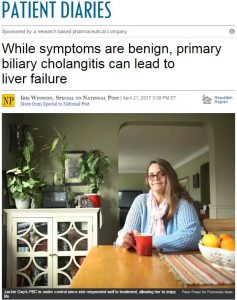
PBC is experienced differently by each of us. Someone in Stage 1 may be extremely symptomatic, while others in Stage 4 are completely symptom free. For many of us, it is challenging to live with PBC and it can be difficult to explain to others (even some folks with PBC who are asymptomatic), what it is like living with symptoms from a chronic illness day to day. It is even a struggle for us to get our heads around not being able to do what we used to do, but that doesn’t change our desire and need to stay connected to friends, family and others, let alone meet new people.
Those of us with PBC need to find ways to communicate with others, helping them to better understand and empathize with our experience. So … in the spirit of more open communication, here are some of the underlying meanings behind statements you may hear from someone with PBC:
- ‘Thanks, but I don’t feel great’
“But you look alright (great, healthy, good)” is something many of us with PBC hear from others after letting them know we have a chronic illness. The good thing is we don’t look ill. The bad thing is we don’t look ill, so others have a hard time understanding we may be living with debilitating symptoms from a disease that, as yet, has no cure.
- ‘I’m sorry but I can’t commit, or I may need to cancel. Are you okay with that?’
Fatigue, the #1 symptom of PBC, can be chronic or intermittent, and there is no warning of when it will come on or when it will let up. This makes it hard to commit to things, as many of us cannot predict how we will feel from day to day or even from week to week. When we do make plans we may have to cancel them, and then feel guilty for letting others down. We also worry that friends, family and colleagues will not be open to tentative plans, for everyone prefers certainty, and all of this can lead to concern about losing friendships.
- ‘It has nothing to do with willpower or not looking after myself.’
We live with uncertainty and we wish we didn’t have to add uncertainty to others’ lives as well. Some days we can go for a walk, shop, or see a movie, and some days we can’t get out of bed. Everything takes energy and we have a limited amount. An outing can take up a lot of energy, especially if we overdo it when we are feeling good (which is very easy to do). And we often pay for it, needing to rest for the next few days (even weeks) depending on each individual. With only so much energy, we need to pick and choose what activities we do each day. Learning to strategize and live with this uncertainty is an ongoing education.
- “No, I’m good, thanks”.
It’s hard to ask for help, and sometimes we should ask but are reluctant. It’s hard to lose one’s independence and the ability to look after ourselves the way we once could. In an attempt to not burden others or appear needy and/or lazy, we pretend we are all right instead of asking for help. We forget that people can’t read our minds and usually take “no, I’m good” at face value.
- “Actually I don’t drink alcohol”
There are over 100 liver diseases, but most people associate liver disease with alcohol abuse. PBC is an autoimmune disease, with a genetic link that can’t be blamed on lifestyle choices. We didn’t “do” anything to get it and we don’t drink alcohol (or we drink very little) because we don’t want to tax our liver anymore than is necessary.
- ‘I’m sorry I didn’t mean it to come out that way.’
Whether due to toxins backing up into our brains in late stage PBC from my liver’s inability to detoxify, or brain fog from fatigue, or just low tolerance due to not enough energy to think before speaking, it can be challenging to get the correct words out and sound coherent. This can be frustrating and we may come across as curt or impatient. We really are sorry, but sometimes there just isn’t enough energy for decorum, especially if our tolerance level has been depleted by pain and insomnia.
- ‘I’m not contagious, it is a symptom of PBC.’
PBC itch feels different to each of us who has it: like bugs crawling under the skin, deep, burning, urgent, relentless and they still haven’t found something to alleviate it. We take various medications but most are ineffective. It can be crazy-making, especially at night when it’s usually the worst for most folks. We struggle with resisting the desire to rip our skin off, never mind get to sleep.
- ‘I’m not paranoid about drugs, I’m being responsible for my choices.’
Prednisone may be effective for some autoimmune issues. NSAIDs or Tylenol are often used for pain, and turmeric for inflammation, but we need to be very careful what drugs, herbs, and lotions we use. Most of them are filtered through the liver and our livers are already compromised and working very hard. We choose to lighten the load by seeing if we can find alternate ways of dealing with the side effects.
- ‘I have to eat this way to feel well.’
The liver is part of the gastrointestinal system and is a workhorse with several very important jobs. It detoxifies, metabolizes, helps digestion, makes proteins, breaks down fat for energy, processes all food into glucose and stores it for use throughout the body. It also stores Vitamin B12 and iron, secretes bile to clear blood, and filters and clots blood. Everything we eat is processed by the liver. As we are all individuals, we need to discover for ourselves what foods help or hinder our liver and gastrointestinal health. Many of us also have other health conditions and must take them into consideration. So, for example, while someone may have Celiac disease or be gluten sensitive, someone else may need extra vitamin K or D.
- ‘Yes, I want to be fit and healthy and I’m honestly doing the best I can.’
While ideal weight, being physically fit, and eating a healthy diet is a desire for us all, it is not easy for many who suffer profound fatigue with or without pain. We would give anything to have enough energy to go to the gym, go for a walk, shop or cook healthy meals. Sometimes we: a) just don’t have enough energy, b) have spent it on doctor’s appointments or taking the kids to school, or c) are in bed trying to recover from the last walk or trip to the gym. It’s challenging living with the shame and embarrassment we feel for not being able to look after these basic health needs, and we dread the judgments from others who don’t understand our challenges or assume it speaks to a flaw in our character.
- “Actually the (pain, dental problems, dry mouth, insomnia, etc.) isn’t necessarily a symptom of PBC, I also have _____________?”
Autoimmune diseases have a way of clustering, and we can have other autoimmune diseases or have the symptoms of them without the actual diagnosis. Illnesses such as Sjogren’s Syndrome, Rheumatoid Arthritis, Fibromyalgia, Osteoporosis, Autoimmune Hepatitis, Wilson’s disease, Diabetes, dental issues, etc can accompany PBC. So while fatigue and itching are the two main symptoms, many of us live with a host of other conditions and symptoms as well.
- “Thank you so much.”
Receiving calls, emails, texts, cards or letters via snail mail make us grateful for the connection with others. We may have slowed down in reaching out ourselves due to one or all of the above reasons (can’t commit, don’t feel well and don’t want to complain, have no energy or brain clarity left for talking or writing, spending all our energy on appointments instead of chats with friends). While we would organize more outings, and call more often if we could, when someone takes the initiative and time to reach out to us, we are eternally grateful.
Disclaimer: The above article is taken from talking to others with PBC and from my own experience. As I’ve stated above, PBC is very individual in how we each perceive and experience it and in no way do I mean to presume I know what it is like for everyone. My intention was to give voice to some of the struggles many of us navigate while living day to day with PBC.
In My Humble Opinion,
Kathryn S






 Doctors advise PBC patients to eat healthy and watch their weight. But with so many diets, how do you decide which healthy diet is right for you?
Doctors advise PBC patients to eat healthy and watch their weight. But with so many diets, how do you decide which healthy diet is right for you?